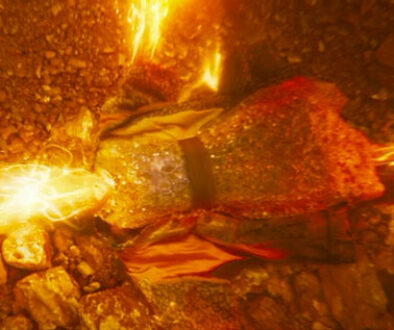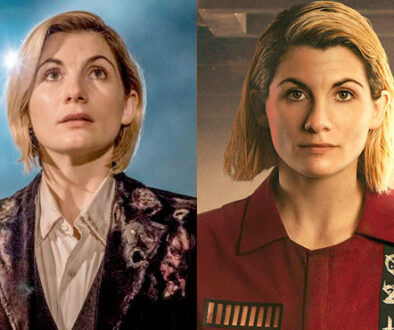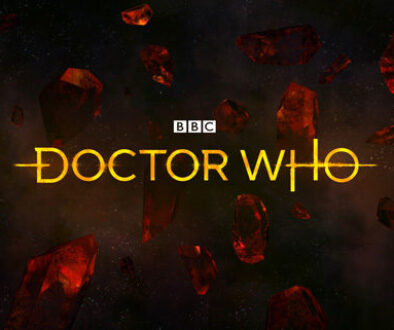“The Timeless Children” Review, Part 1 – Exposition of the Cybermen
Clint Hassell gives his SPOILER-filled commentary on the tenth episode of Series 12.

Note: this review contains full SPOILERS for episode 10 of Series 12.
A multi-Doctor adventure featuring three iconic villains, the resolution of one companion’s story arc, and a beautifully realized Gallifreyan setting, the Series 12 finale, “The Timeless Children,” is certainly epic in scope. Still, scale and quality are different measures. While some fans are bound to decry the massive changes to canon as the episode’s biggest fault, a review of the underdeveloped script shows that the episode’s narrative lacks the emotional depth necessary to bolster its own weight.
Most noticeably, the script contains an unforgiveable amount of exposition. Rather than woven organically into the storyline – – possibly over a series-long arc – – the changes in the show’s lore are delivered to the audience via the Master, who recaps the story of the titular “timeless child” to an incapacitated Doctor. This forces the Doctor to be a passive audience to her own story, which literally plays out around her, a holographic infodump of continuity changes. This practice of characters talking at each other continues through the entirety of the episode. Ravio, Yedlarmi, Graham, and Yaz deliberate over how to escape the Cybercarrier; the Master and Ashad discuss their plans for conquest; Graham and Yaz have a quiet conversation, as Ravio and Yedlarmi work off-screen; a line of reunited survivors discuss the perils of rescuing the Doctor; the Master explains the Doctor’s own feelings to her. The Doctor even talks to herself, in two different ways, while inside the Matrix mainframe! Only, Ethan, Ryan, and Ko Sharmus see much physical action, and that mostly involves running from invading Cybertroops.
Overburdened with the sheer amount of newly revealed backstory it must recapitulate, the narrative is forced to take shortcuts, often resorting to some of science fiction’s worst tropes. In seeming contrast to previous depictions of Shobogan society as pre-industrial, Tecteun single-handedly develops faster-than-light space travel and maps out several nearby galaxies within the early part of her own life. While this plot point stretches credulity, it is necessary, considering the episode’s time constraints and story needs. However, all believability is forsaken when Tecteun is further revealed to be a capable geneticist, who sequences and splices the regenerative capabilities of a separate species into her own.
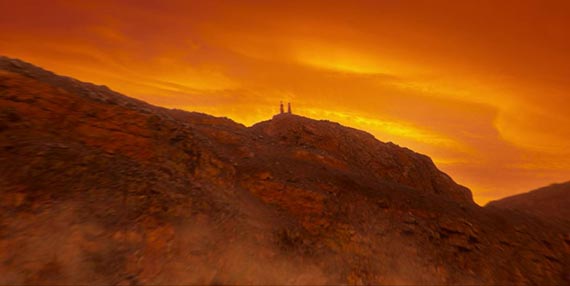
Story structure and logic complaints notwithstanding, the script’s biggest issue lies in its dependence on the Doctor’s emotional response being out-of-scale compared to the Master’s revelations. “The child is you,” the Master declares, “You are the Timeless Child.” “No! No, I am not! I can’t be,” the Doctor cries, a look of horror in her eyes, later screaming, “Why would they lie?! Why would they do that?!” The Master later chides the Doctor, stating, “I know you are broken.” Yes, the Doctor learns that she was space-adopted, but would that really cause this level of identity crises, especially in a Time Lord who inhabits several identities over the course of a lifetime? This seems like a bit of an overreaction.
Showrunner Chris Chibnall has written this exact storyline before – – and better – – with Jack Harkness, who was rightly angered at an inexplicably missing, two-year span of his life. What had he done? Who had he loved? What friendships had he formed in that time? What memories were languishing uncherished in his amnesiac mind? Unfortunately, “The Timeless Children” doesn’t deal directly with any of these issues. The Doctor discovers that she’s the key to her adoptive race’s spectacular anatomy, allowing the Time Lords to accumulate generations of knowledge within individual lifespans and leading to the creation of an accomplished Gallifreyan society. How is this a bad thing? Why is she not more upset that she was utilized as a test subject, or that she had her mind erased?
What could have been a poignant conversation regarding a person’s agency over their own body and thoughts – – fitting, considering some of the themes present in Chibnall-era episodes and also in current, real-world political and social dialogues – – is skipped in lieu of a lesser discussion on identity. A notable conversation between Thirteen and her previous Ruth form capitalizes on this theme:
the Doctor: “Where is it you fit into all of this? Were you me, all that time ago? Were all my memories of you erased? Did they force me back into becoming a child? How many more of me are out there?”
Ruth: “I don’t have those answers. But, say I did – – would they even help?”
the Doctor: “Of course, they would! All this? It means I’m not who I thought I was.”
Ruth: “Because your memories aren’t compatible with what you’ve learned today?”
the Doctor: “Yes.”
Ruth: “Have you ever been limited by who you were before?”
Still, compared to the fire demonstrated as the Doctor shoves the Master to the ground, it seems a missed opportunity that her yelling, “Show me the rest! I have a right to know my own life!” is as close to dealing with a person’s agency as this episode dares get.
Worse, the amount of time spent justifying the Doctor’s psychological angst means that many questions go unanswered, and that two subtle, but critical changes to the Doctor’s persona go completely unexplored. (But will be covered in Part 2 of this review!)
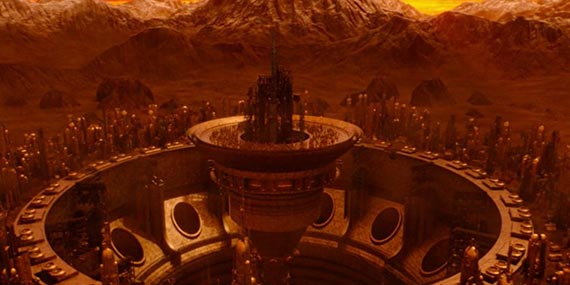
Despite these criticisms, “The Timeless Children” does contain some nice moments. The episode’s pacing is fantastic. Cutting between the Doctor’s origins, Ryan eluding the invading Cyberarmy, Yaz and Graham evading Ashad and his troops, and the revelation of the new Cyber Masters isn’t easy, and the script does it without dropping the tension.
While Sacha Dhawan is at his manic best as the Master, lead actress Jodie Whittaker is a marvel as she turns her most ranged performance as the Doctor to date. Her unbridled anger as she shoves the Master to the ground; the way she recalls David Tennant’s Tenth Doctor as she brandishes a Death Particle-laced explosive; her joyous expression of self-love, having accepted the depths of her newly-discovered potential; the subtle heartbreak conveyed in the turn of her face as she asks the Master, “Why did you do this?” – – Whittaker’s talent is such that she can make a three-word statement, “Live great lives,” feel like an apt exit for her current companions, and the camera lovingly frames every aspect of her nuanced performance.
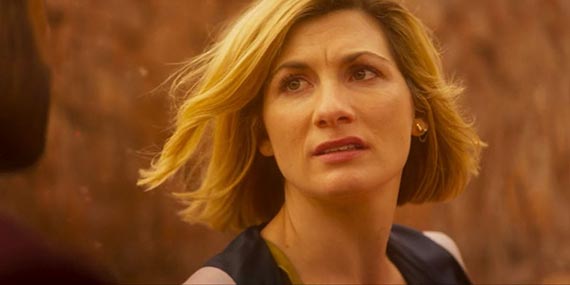
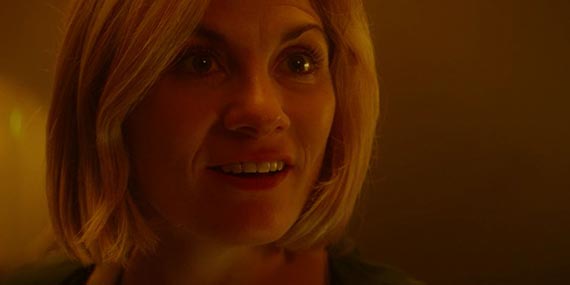
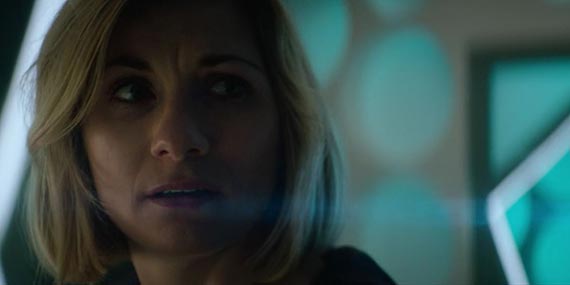
To his credit, Chibnall realizes that seeing the Doctor use her mind to both escape the Matrix and defeat the Cyber Masters is less engaging than examining a Doctor pushed to the point where she considers destroying the last vestiges of her home world with the Death Particle. Had this script been written by former showrunner Steven Moffat, the Doctor would have exploited her newfound genetic connection to all Gallifreyans to mentally reprogram the Cyber Masters to be pacifist.
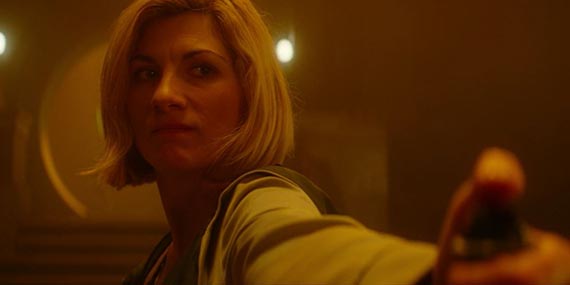
Moreover, the episode’s script contains a number of thoughtful moments that demonstrate Chibnall’s knowledge of Doctor Who’s history – – enough, in fact, to allow one to look beyond his changes to canon, if only until their lasting effects can be judged in context. The Master’s assertion that “Tecteun glimpsed the infinite through that gateway,” recalls his experience viewing the Untempered Schism as a Gallifreyan child. After being adopted by a space explorer, is it any wonder that an adult Doctor chose to flee his home planet to wander the stars? Note that, despite changing the Doctor’s backstory, Chibnall leaves the basic message of the series intact: “The Universe still needs you,” Ko Sharmus tells Thirteen, “so I suggest you run, Doctor. Run!”
(Time) Capsule Review
“The Timeless Children” fails not because of its continuity-redefining retcon to the Doctor’s origin, but because its level of exposition forces the Doctor to be a passive observer to her own story. Rather than addressing issues of agency or consent, the episode devotes too much time to the Doctor’s existential identity crisis. Still, both Sacha Dhawan and Jodie Whittaker deliver impeccable performances, and the episode’s cinematography certainly delivers on the promise of the script’s epic scale.



